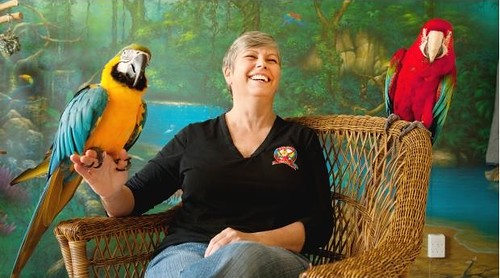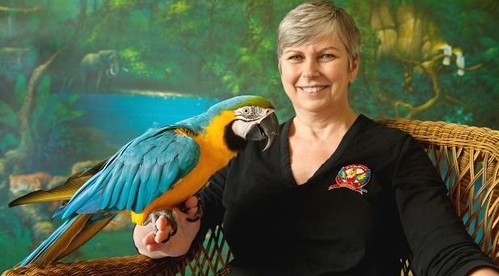 Most of the birds Judy Tennant rescues — she currently has 15 — are the result of well-meaning owners who discover too late the enormous commitment required of having a parrot. Photograph by: Bruce DeachmanOTTAWA — Judy Tennant literally wears the trials of her profession on her sleeve. Her arms and hands are scarred by the claws and beaks of the parrots she’s rescued, and she’s twice been sent to the emergency ward of the hospital by Sinbad, a Green-winged macaw in her care that arrived with nasty aggression issues.
Most of the birds Judy Tennant rescues — she currently has 15 — are the result of well-meaning owners who discover too late the enormous commitment required of having a parrot. Photograph by: Bruce DeachmanOTTAWA — Judy Tennant literally wears the trials of her profession on her sleeve. Her arms and hands are scarred by the claws and beaks of the parrots she’s rescued, and she’s twice been sent to the emergency ward of the hospital by Sinbad, a Green-winged macaw in her care that arrived with nasty aggression issues.
“I’m a slow learner,” Tennant jokes, noting that some of her parrots have more pressure in their beaks than an American pit bull. “They can do serious damage.”
But unlike some animal trainers, she does not wear her scars like badges of honour. “Every one I have means I made a mistake,” she insists. “In the case of Sinny, I was rushing him and wasn’t reading his body language.”
Apart from the damage they can wreak, parrots also live to be about 80 and have the mental capacity of a five-year-old, factors that contribute to people wanting them as pets, and to people subsequently wanting to get rid of them as pets.
From her noisy home in Beckwith, near Carleton Place, Tennant helps both, taking in parrots and their cockatoo cousins from homes where they’re not cared for properly, then training them and their potential new owners and eventually putting them together in better homes.
“We’re able to get them out better than when they came in,” she says.
To help with expenses — she estimates it costs $25 a day to feed, house and care for a macaw, for example — she takes some of the better-trained ones to seniors’ homes, birthday parties, schools and daycares — a couple each week, on average — where she hopes to instil some awareness between YouTube-worthy bird dances. She also trains her Parrot Troopers — teenagers who learn about the birds and their care and are subsequently paid to help at parties. The work her Troopers do qualifies for their required high school volunteer hours and, she hopes, readies them to be the next wave of rescuers.
“Just about everyone who has a parrot now will be outlived by their bird,” she says. “We’re trying to teach the next generation to take care of them. And if we get that database of past troopers, hopefully we’ve got a place when somebody needs to re-home their bird.
“That’s a big problem now; they jump from home to home to home, and every time they jump, their behaviour gets a little worse.”
The party side of her Parrot Partner business exists for the birds, she says, not the other way around. The birds are flock animals and enjoy the socialization.
“When I get a bird that’s far enough along in his behavioural rehabilitation that he needs the slight challenge of going to see extra people, then we might take him into a nursing home.
 Parrot rescuer and trainer Judy Tennant with one of the 15 birds currently in her care. Photograph by: Bruce DeachmanBut she won’t make her parrots perform at events if she feels they’re not ready, and will cancel a party rather than subject one to unnecessary stress. She points to a female macaw, Bodie, currently tending an unfertilized egg it laid. Until it stops sitting on the egg in the hope that it hatches, Tennant won’t make it leave its cage.
Parrot rescuer and trainer Judy Tennant with one of the 15 birds currently in her care. Photograph by: Bruce DeachmanBut she won’t make her parrots perform at events if she feels they’re not ready, and will cancel a party rather than subject one to unnecessary stress. She points to a female macaw, Bodie, currently tending an unfertilized egg it laid. Until it stops sitting on the egg in the hope that it hatches, Tennant won’t make it leave its cage.
“That would be inhumane,” she says. “If we can’t do a party, we’ll tell the person ‘We’re sorry we can’t; we just don’t have the right mixture. We’ll refund your money and please come to the aviary as our guest.’”
She’s also planning a kids’ camp, to begin next summer, and if she can raise the necessary funds, would like to build a larger aviary outside her house.
Although her Parrot Partner animal education and training centre — online at parrotpartner.com — has only taken flight over the past four years, its genesis came a little more than a decade earlier, when Tennant, with a graduate degree in education and a specialized interest in operant conditioning, or positive reinforcement, for autistic children, had her own pet parrot that was acting out.
“I didn’t know what to do,” she recalls, “and a professor I had said, ‘C’mon, think! You know what to do.’
“She said, ‘It’s the same,’ and then the light went on. I put two and two together that I already had the skills to deal with it. That’s where it started.”
She researched the species, helping out at other rescue operations and training with Disney’s animal handlers.
Most of the birds she rescues — she currently has 15 — are the result of well-meaning owners who discover too late the enormous commitment required of having a parrot, a social animal that demands a great deal of attention. Others come from homes where the birds are actually being mistreated, or from homes where the owner has died and the family can’t take care of, or doesn’t want, a parrot.
After dogs and cats, and discounting fish for their un-pet-likeness, birds are the most popular pets in North America, ahead of horses and reptiles. Parrots are especially sought-after for their ability to speak.
Training birds — she teaches them tricks, but also such skills as how to present themselves for husbandry and how to wait until they’re not on someone’s shoulder before emptying their bladders, all behaviours that will likely improve their relationship with their next owner — is enormously time-consuming, in some cases taking between three and five years, depending on their behavioural problems. Apart from those that have been mistreated, either malevolently or with the best intentions, Tennant cites the fact that parrots are, at most, only one generation away from the jungle, as a major impediment.
“People are inadvertently damaging these birds, both behaviourally and physically. They don’t mean to, but the parrots are so new out of the jungle that we don’t know about them yet, and we treat them like dogs.
“They haven’t had the hundreds or thousands of years it takes to be domesticated as a species,” she says, adding that she’d rather that people never had parrots as pets in the first place, a sentiment at least partially echoed by the many countries, including Canada, that now ban or limit the import of certain exotic species.
“For every one bird that made it to North America or Europe, up to eight or nine died during the transport.
“I don’t like the fact that these guys are being domesticated,” she adds. “I don’t think we should do it. But that ship has sailed — they are going to be domesticated, so we might as well get in there and make it as easy a transition as we can.”
And when she speaks at the Ottawa Pet Expo Nov. 10 and 11 at the CE Centre, her topic will be “Is a parrot the right pet for you?” She’s hoping to dissuade people against the idea, rather than convince them to become parrot owners.
As one parrot enthusiast noted, owning a parrot is like having a toddler with an anger management problem and a can opener on its face.
“I’m hoping to draw them to the conclusion that no, it isn’t,” says Tennant. “When people buy out of a pet store or from a breeder or Kijiji, they may not be getting the information they need. I consider it my job just to give them the facts.
“They poop every five to 10 minutes, they’re noisy, here’s their beak strength and natural instincts, they live for 80 years, you can’t wear earrings or perfume around them.”
When a bird that Tennant’s team has rehabilitated is finally ready to leave for a new home, they’re not sold, but rather given to their new owner. The owner, however, is required to undergo training in its proper care. She also offers a “try-before-you-buy” program that helps ensure potential owners understand what they’re in for.
“No one who leaves with a bird leaves without training,” she says. “We put so much work and effort into them, we don’t want somebody inadvertently undoing that and bringing them back.”